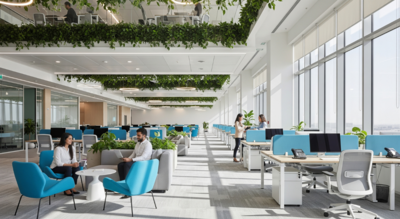ARTICLE AD BOX

UAE employees want 67% of their workweek in-office, but only 31% feel their current spaces support their best work due to noise and layout issues. (Representational Image)
Global architecture and design firm Gensler has released its 2025 Global Workplace Survey, delivering an in-depth look at what office workers want, and aren't getting, in the United Arab Emirates.
Marking its twentieth edition, the survey drew insights from more than 16,800 full-time office workers across 15 countries, including a focused sample from the UAE. The survey findings come at a crucial moment as the UAE pushes forward on national priorities such as the “We the UAE 2031” vision and the National Strategy for Wellbeing. With this momentum in mind, the report provides a practical roadmap for employers and developers aiming to build future-ready workspaces aligned with innovation, talent attraction, and sustainable growth. “The UAE has become a global benchmark for ambition and adaptability,” said Edith Eddy, Senior Interior Designer, Workplace, at Gensler Middle East. “In cities like Dubai and Abu Dhabi, we are witnessing rapid shifts in how people live and work, and the workplace must evolve accordingly. Our research reveals a clear gap between what employees need to thrive — flexibility, creativity, and connection, and what their current spaces provide.
Bridging this gap will be essential for organisations aiming to attract talent, foster innovation, and design workplaces that truly support the future of work in the Emirates.
”
Workplace satisfaction in the UAE: Improvements, but still not enough
Despite heavy post-pandemic investment in upgraded office spaces across the UAE, including new, in-demand office buildings in Dubai and Abu Dhabi, only 31% of UAE office workers strongly agree that their current workspace enables them to do their best work, according to Gensler.
This places the UAE ahead of France and Japan, but behind the UK, India, and the United States in workplace satisfaction. Common pain points remain:
- Noise
- Lack of room availability
- Layout inefficiencies
Top improvement areas identified by employees include:
- Quiet spaces for focus
- Better meeting room acoustics
- Access to informal collaboration zones
A lot of noise is rated as the biggest concern voiced by UAE office staff about their workplaces
A shift away from traditional ‘business hubs’
- “Creative labs”
- “Nature retreats”
These settings are described as flexible, tranquil, and purpose-driven environments that support innovation and wellbeing.
“This reflects a global trend away from rigid corporate settings,” the Gensler report states. The UAE is now ranked among the top five countries worldwide where employees show a strong preference for imaginative and wellness-focused workspaces.
In-office work still matters- if the office serves a purpose
While flexible work is valued, UAE employees still see the office as essential. Respondents said 67% of their ideal workweek should be spent in the office, well above the global average of 60%.
Yet actual attendance is lower, largely because current office setups aren’t meeting employee needs. Top reasons for in-office attendance include:
- Team meetings
- Confidential conversations
- Visibility to senior leadership
However, only 28% of UAE workers believe their meeting spaces are adequately equipped to support these functions.
Amenities and neighbourhood features are increasingly important
Gensler’s survey also looked beyond the office walls. UAE employees showed a stronger-than-global-average preference for certain amenities both inside and around the workplace. Most valued in-office amenities:
- Cafés
- Coworking zones
- Quiet rooms
- Libraries
- Innovation hubs
Preferred surrounding neighbourhood features:
- Walkable access to coffee shops
- Medical centres
- Outdoor green spaces
- Religious or spiritual facilities
These preferences signal a broader desire for community-integrated, holistic work environments that support both professional productivity and personal wellbeing.



.png)
.png)
.png)
















 3 days ago
8
3 days ago
8









 English (US) ·
English (US) ·